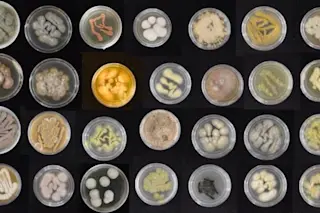A new batch of genetically engineered bacteria may be able to slash the cost of producing ethanol from tough materials like wood chips and switchgrass, pushing the young ethanol industry closer to its goal of creating commercially competitive alternative fuel
from the waste products of farming and forestry. Ethanol from cellulose, the kind of sugar in the likes of cornstalks and sawdust, is being promoted as an environmentally friendly alternative to fossil fuels, with the advantage that it does not use food crops such as corn as raw materials [Reuters].
Ethanol from corn and sugarcane is relatively easy to produce, because yeast convert the readily accessible sugars and starches into ethanol.
Cellulose presents a stiffer challenge. Cellulose fibers contain longer polysaccharide chains than those found in starches and surround them with lignin and hemicelluose, which hold the fibers together and provide strength. This makes them tough—tough enough to hold up ...













